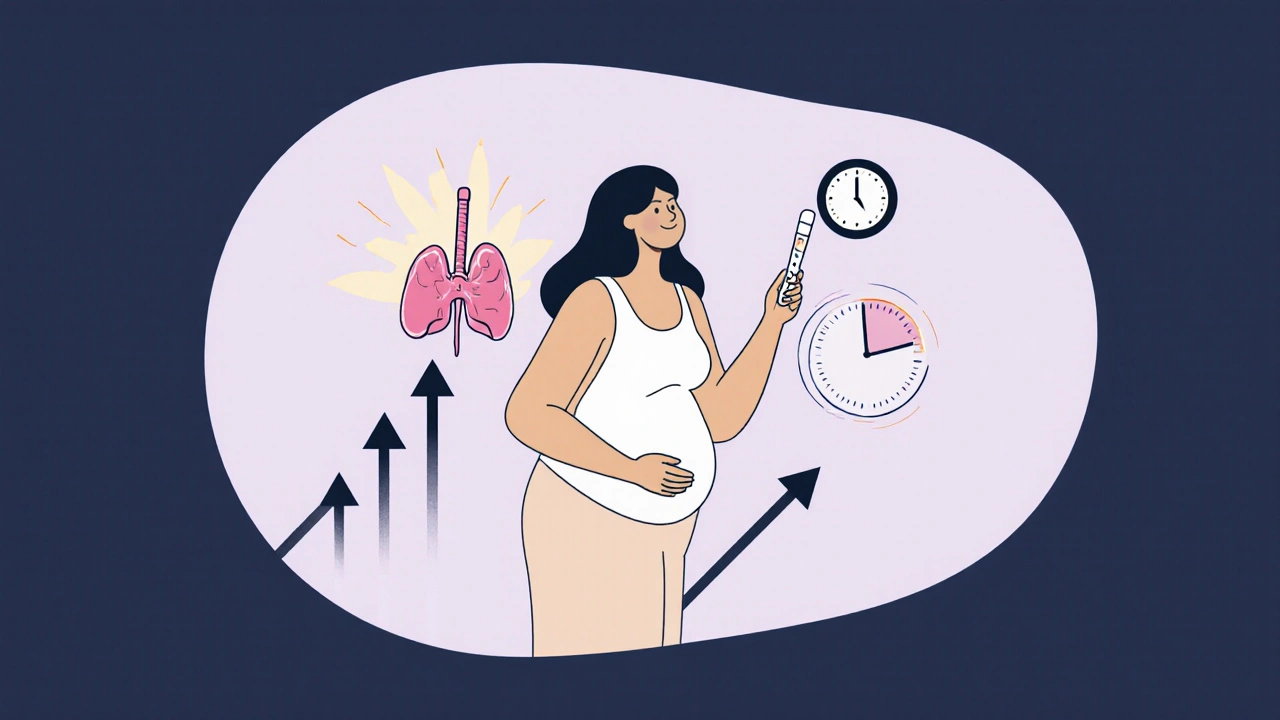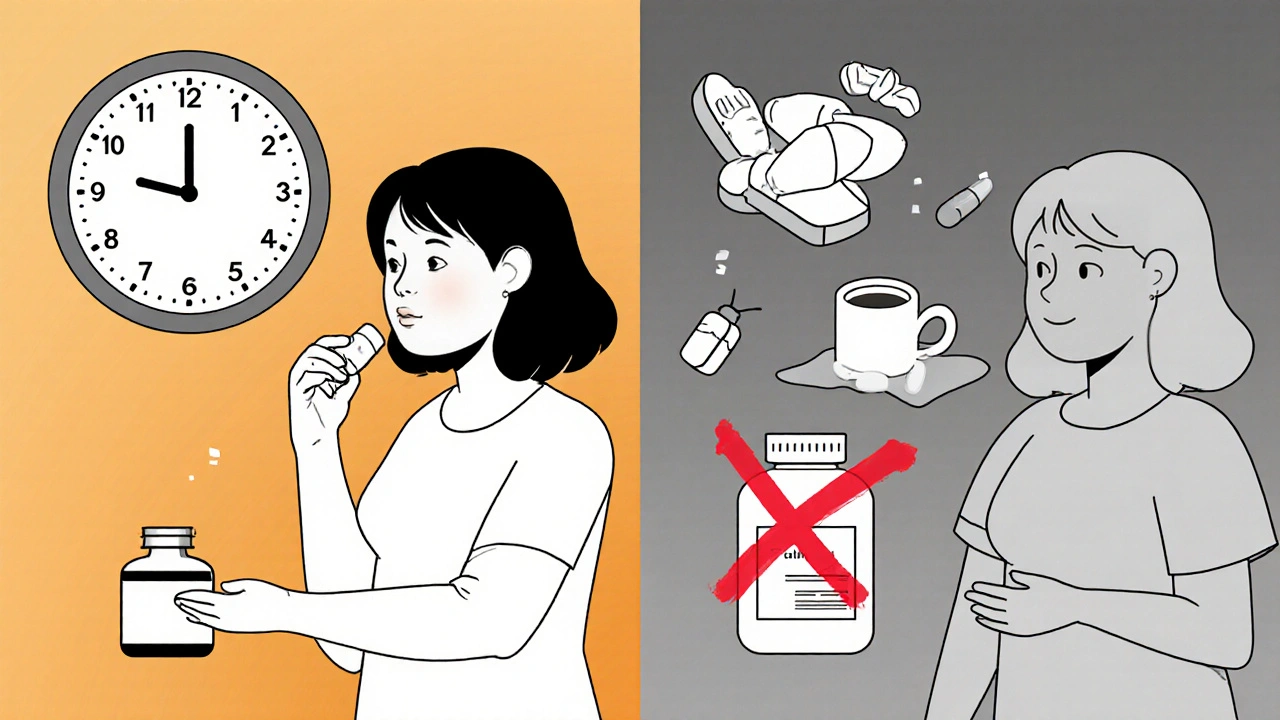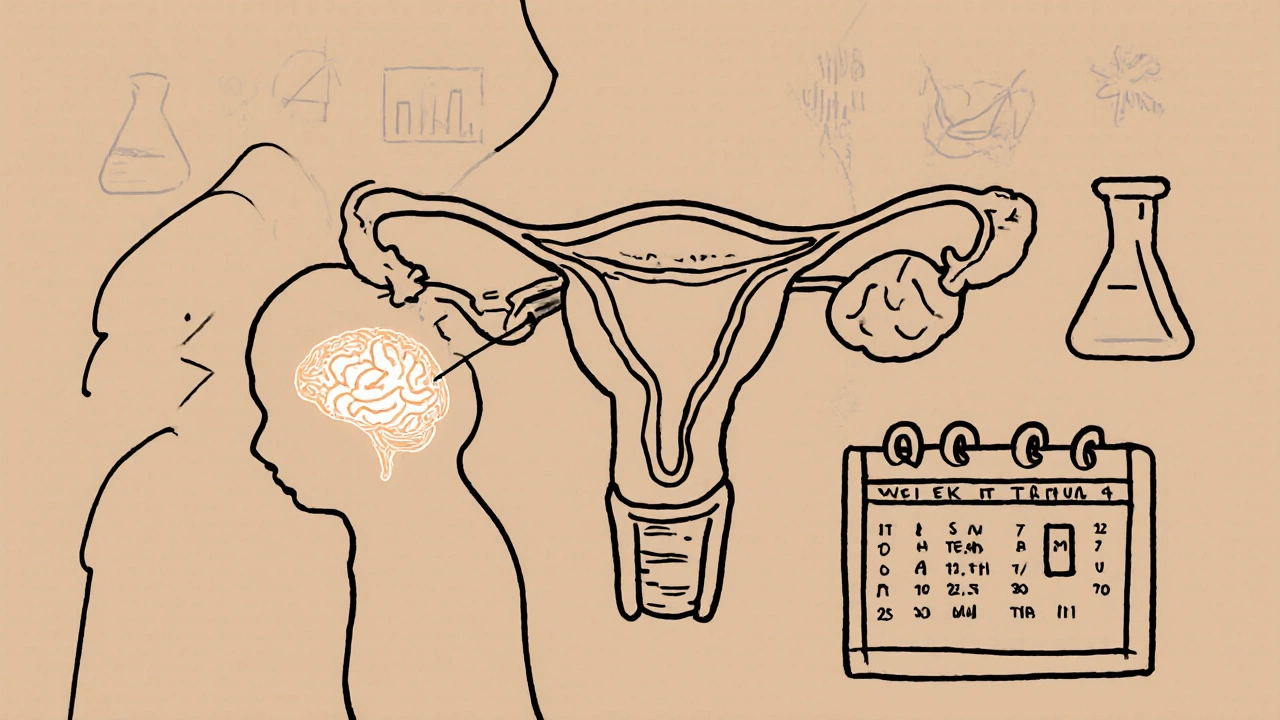
When you find out you're pregnant, your body changes in ways you can't always see. One of the most important, yet often overlooked, changes happens in your thyroid. If you're taking thyroid medication-usually levothyroxine-your dose isn't going to stay the same. In fact, most women need more of it, and fast. Waiting too long to adjust your dose can affect your baby’s brain development, increase your risk of miscarriage, or lead to preterm birth. This isn’t theoretical. It’s backed by data from thousands of pregnancies and decades of research.
Why Your Thyroid Needs More Help During Pregnancy
Your thyroid makes hormones that control metabolism, energy, and, critically, your baby’s brain development. Before 10 to 12 weeks, your baby can’t make its own thyroid hormone. It relies entirely on yours. That’s why even a small drop in your hormone levels during the first trimester can have lasting effects. Studies show that children born to mothers with untreated or poorly managed hypothyroidism score 7 to 10 points lower on IQ tests compared to those whose mothers had well-controlled levels. The hormone demand jumps almost immediately after conception. Your body produces more thyroid-binding proteins, which bind up your existing hormone, making less available. Your thyroid also has to work harder to keep up. For women already on levothyroxine, this means the dose they were taking before pregnancy is no longer enough. On average, women need a 20% to 30% increase in their daily dose-some need even more.How Much More Do You Need?
There’s no one-size-fits-all answer, but guidelines give clear starting points. If you had hypothyroidism before getting pregnant, the American Thyroid Association (ATA) recommends increasing your dose by 20% to 30% as soon as you know you’re pregnant. That’s roughly 2 extra doses per week. For example, if you were taking 75 mcg daily, you’d jump to 90-95 mcg. Some doctors, especially those following ACOG guidelines, recommend a flat 50 mcg increase right away. If you’re newly diagnosed during pregnancy, dosing depends on your TSH level:- If your TSH is 10 mIU/L or higher, start at 1.6 mcg per kg of body weight per day.
- If your TSH is below 10 but still high, start at 1.0 mcg per kg per day.
When to Adjust: Don’t Wait
Timing matters more than you think. The first 6 weeks of pregnancy are the most critical for your baby’s brain. By week 10, your baby’s thyroid starts working-but it’s still dependent on you. That’s why experts say: adjust your dose the day you get a positive pregnancy test. Don’t wait for your first OB appointment. Don’t wait for your next blood test. If you’re on levothyroxine and think you might be pregnant, call your doctor. Get your dose adjusted before you even sit down for your first prenatal visit. One patient shared on a thyroid forum: “My OB said to wait and see. At 8 weeks, my TSH was 4.2. I panicked. My baby’s brain was already developing with too little hormone.” She ended up needing two dose increases in three weeks. That kind of delay is avoidable.Monitoring: Check Your TSH Every 4 Weeks
You can’t guess if your dose is right. You need blood tests. The ATA recommends checking your TSH within 4 weeks after any dose change-and then every 4 weeks until your levels stabilize. After that, check again at 24-28 weeks and 32-34 weeks. Some doctors also test at 6 weeks and 16 weeks. Target TSH levels vary slightly by guideline:- American Thyroid Association: Keep TSH ≤ 2.5 mIU/L throughout pregnancy.
- Endocrine Society: ≤ 2.5 in first trimester, ≤ 3.0 in second and third.

How to Take Your Medication Right
Taking your pill wrong can undo all your hard work. Levothyroxine is absorbed best on an empty stomach. Take it first thing in the morning, wait 30 to 60 minutes before eating or drinking anything besides water. Avoid coffee, calcium supplements, iron pills, and antacids for at least 4 hours after your dose. These can block absorption by up to 50%. Some women try to make up for missed doses by doubling up on weekends. But that can cause spikes and dips in hormone levels. Instead, spread extra doses evenly across the week. If you need 2 extra doses per week, take one extra dose on Monday, Wednesday, and Friday-instead of two on Saturday and Sunday.What If You’re Still Struggling?
Even with the best intentions, things don’t always go smoothly. A 2019 survey of 150 OB/GYNs found that 68% didn’t routinely check TSH at the first prenatal visit for women with known thyroid disease. That’s a gap in care. If your doctor doesn’t mention testing, bring it up. Say: “I’m on levothyroxine. I need a TSH test now, and then every 4 weeks.” Patients on Reddit and health forums often report having to advocate for themselves. One wrote: “I had to push for my dose to be increased at 6 weeks. My OB said, ‘It’s probably fine.’ I got my blood drawn anyway. My TSH was 4.8.” She ended up needing a 50% increase. Her daughter is now a healthy toddler with no developmental delays.Technology and Tools That Help
You’re not alone in managing this. The ATA’s “MyThyroid” app, used by over 12,500 pregnant women since 2019, helps track doses, blood test results, and appointment reminders. Eighty-seven percent of users say it improved their adherence. Electronic health records like Epic now have built-in alerts that flag pregnant patients on thyroid meds and prompt providers to check TSH levels. There’s also new research on AI-driven dosing. The 2022 ENDO trial showed that using algorithms based on pre-pregnancy TSH, weight, and antibody status improved TSH control by 28% compared to standard dosing. While this isn’t mainstream yet, it’s coming fast.
What About Breastfeeding?
Good news: levothyroxine is safe during breastfeeding. Only tiny amounts pass into breast milk, and studies show no effect on infant thyroid function or development. You can keep your pregnancy dose or slightly reduce it back to your pre-pregnancy level after delivery. Most women return to their pre-pregnancy dose within 6-8 weeks postpartum. Check your TSH again around 6 weeks after giving birth to make sure you’re back on track.What’s Changing in 2025?
In 2023, the ATA reversed its stance and now recommends universal TSH screening in early pregnancy-not just for women with known thyroid disease. That’s a big shift. It means more women will be caught early, even if they didn’t know they had a problem. The WHO added levothyroxine to its Essential Medicines List for maternal health, recognizing its role in preventing preventable developmental delays. In low-income countries, only 22% have consistent access to the drug-contributing to 15% of avoidable cognitive delays in children. That’s a global issue, but in places with access, the tools and knowledge to manage this well are now clear.Bottom Line: Act Early, Test Often
If you’re pregnant and on thyroid medication:- Adjust your dose immediately upon confirmation-don’t wait.
- Get your TSH tested within 4 weeks of the change, then every 4 weeks.
- Take your pill on an empty stomach, 30-60 minutes before food.
- Avoid calcium, iron, and antacids for 4 hours after your dose.
- Keep your TSH under 2.5 mIU/L during the first trimester.
- Continue your dose while breastfeeding-no need to stop.
- Recheck your TSH 6 weeks after delivery.
Should I increase my thyroid medication as soon as I get a positive pregnancy test?
Yes. Thyroid hormone needs increase immediately after conception, even before you know you're pregnant. The American Thyroid Association recommends increasing your levothyroxine dose by 20-30% as soon as pregnancy is confirmed. Waiting until your first prenatal visit can delay critical hormone support for your baby’s brain development.
What TSH level should I aim for during pregnancy?
Most guidelines recommend keeping your TSH below 2.5 mIU/L during the first trimester. In the second and third trimesters, some experts allow up to 3.0 mIU/L, but many doctors still aim for under 2.5 throughout. The goal is to prevent even mild under-treatment, which has been linked to lower IQ scores and higher miscarriage risk.
Can I take my thyroid pill with food or coffee?
No. Levothyroxine is absorbed best on an empty stomach. Take it first thing in the morning, then wait 30-60 minutes before eating or drinking anything besides water. Coffee, calcium supplements, iron pills, and antacids can block up to half the absorption of your dose. If you take these supplements, wait at least 4 hours after your thyroid pill.
Is it safe to breastfeed while taking thyroid medication?
Yes. Levothyroxine is considered safe during breastfeeding. Only trace amounts pass into breast milk, and studies show no negative effects on infant thyroid function or development. You can continue your pregnancy dose or gradually return to your pre-pregnancy dose after delivery. Check your TSH 6 weeks postpartum to make sure you’re at the right level.
What if my doctor doesn’t check my TSH during pregnancy?
Many OB/GYNs don’t routinely test TSH in pregnant women with known thyroid disease. A 2019 survey found 68% of doctors skip this step. If your doctor doesn’t mention testing, ask for it. Say: “I’m on thyroid medication and need a TSH test now and every 4 weeks.” Your baby’s brain development depends on it. Don’t assume someone else is watching.
Do I need to keep taking thyroid medication after my baby is born?
Yes, but your dose may change. Most women need to reduce their dose back to their pre-pregnancy level within 6-8 weeks after delivery. Hormone demand drops sharply after birth. Get your TSH checked around 6 weeks postpartum to make sure you’re not over- or under-medicated. Don’t stop or adjust your dose without testing.


Comments
steffi walsh
Just found out I’m pregnant and my TSH was 3.1 last month-this post saved me from panic mode. I called my endo today and got my dose bumped up immediately. Seriously, if you’re on levothyroxine and pregnant, DO NOT WAIT. Your baby’s brain doesn’t care about your next OB appointment.
Also, I started using the MyThyroid app and it’s honestly a game-changer. Got reminders for blood tests and even logs my coffee intake so I don’t screw up absorption. 10/10 recommend.
Riohlo (Or Rio) Marie
Oh honey, you think this is revolutionary? In 2018, I published a paper in the *Journal of Maternal-Fetal Medicine* on precisely this topic-thyroid dynamics in early gestation-and got zero attention from OBs. The fact that we’re still having to beg for TSH tests in 2025 is a national disgrace. The WHO’s new listing is progress, but only for those with access. In rural Ireland, women are still being told ‘it’s probably fine’ while their fetus’s cerebellum atrophies. This isn’t medicine-it’s class-based negligence.
And don’t even get me started on the 68% of OBs who don’t test. That’s not incompetence. That’s misogyny wrapped in white coats.
Iska Ede
So let me get this straight-you want me to take a pill on an empty stomach, wait an hour, then avoid calcium, iron, coffee, antacids, and my husband’s protein shake… and if I forget, my kid’s IQ drops 10 points?
Wow. I guess I’ll just stop having babies then. Thanks for the guilt trip, doctor.
Brenda Kuter
I’m not saying the science is wrong, but I’ve been on levothyroxine since I was 19 and now I’m 34 and pregnant and my doctor told me to wait until my 8-week visit. I did. My TSH was 4.8. My baby’s brain was already 7 weeks old. I cried for three days. Then I found a naturopath who gave me selenium and iodine and my levels dropped in a week.
So maybe the real issue isn’t the dose… it’s Big Pharma pushing synthetic hormones when nature gave us seaweed and sunshine?
Also, I heard the FDA is hiding data on thyroid meds and autism. Just saying.
Emanuel Jalba
THIS IS WHY I HATE OB/GYNS 😭
I had to literally scream at my doctor to test my TSH. She said, ‘You’re fine, you’re young.’ I was 28. My TSH was 5.2. My baby’s brain was getting a slow drip of starvation. I cried in the parking lot. Now my daughter is 18 months old and talking in full sentences and I’m still mad.
TO THE DOCTORS WHO IGNORE THIS: YOU ARE HURTING CHILDREN. I HOPE YOU SLEEP AT NIGHT. 🤬
Also, I started taking my pill at 5am and it changed my life. No more brain fog. No more panic attacks. I’m a new woman. #ThyroidWarrior
Katelyn Sykes
Just want to add-don’t forget to check your free T4 too. Some docs only look at TSH and miss the real picture. I had a normal TSH but low free T4 in my first trimester and my endo still bumped my dose. Turned out my body wasn’t converting properly. Took 2 weeks to stabilize but my baby’s growth chart is perfect now.
Also, if you’re taking prenatal vitamins with iron or calcium, take them at night. Separate from your thyroid pill. Trust me, your future neurologist will thank you.
Gabe Solack
My wife just had our second baby and we used the MyThyroid app religiously. Got every blood test done on time, logged every dose, even noted when she accidentally took her pill with coffee (oops). Her TSH stayed under 2.0 the whole time. Our daughter is hitting all her milestones-walking at 10 months, full sentences by 18.
Biggest tip? Don’t just rely on your doctor. Keep your own spreadsheet. Print out the ATA guidelines. Bring them to appointments. You’re your baby’s best advocate.
Also, breastfeeding? Totally fine. We kept her dose the same and she’s still feeling great. No crash after delivery. 🙌
Leilani O'Neill
And yet, in Ireland, we’re still stuck with GPs who think ‘thyroid’ is a type of potato. My sister was told to ‘eat more seaweed’ and ‘reduce stress’ while her TSH climbed to 9. She lost the baby at 10 weeks. No test. No adjustment. Just ‘maybe it was meant to be.’
Meanwhile, the NHS in the UK now has automated alerts for pregnant women on levothyroxine. Why can’t we have that here? Because we’re too busy pretending healthcare is a luxury and not a right. The truth is, we don’t care about mothers here. Not really.
Conor McNamara
wait… so you’re telling me the gov’t knows this and still doesn’t screen everyone? i think this is a psyop. why would they let women have babies if they’re gonna poison the kids with underdosed meds? i read on a forum that the cia controls thyroid meds to control population growth. and the app? it’s tracking us. my phone got weird after i downloaded it. i uninstalled. now i take my pill with lemon water. it’s more natural. my tsh is 1.8. i didn’t tell my doctor. i don’t trust them anymore.
Girish Pai
As a clinical endocrinologist from Mumbai, I can confirm the data is robust. In India, only 12% of pregnant women with hypothyroidism receive adequate care. The cost barrier is real-levothyroxine is available but inconsistent in rural clinics. We’ve piloted community health worker programs with SMS reminders. Compliance jumped from 34% to 81%.
Also, the 1.6 mcg/kg guideline? That’s gold standard. I’ve seen women with TSH >10 deliver neurologically impaired infants. It’s not speculation-it’s clinical reality. Stop waiting. Start testing.
Holly Powell
Let’s be honest: this isn’t about science. It’s about control. The ATA’s ‘≤2.5’ standard was pushed by pharmaceutical lobbyists who profit from more prescriptions. There’s no RCT proving that TSH <2.5 improves IQ. The studies are observational. Correlation ≠ causation.
Meanwhile, women are being overmedicated, experiencing palpitations, insomnia, bone loss. And no one asks: what if your body just doesn’t need that much? What if the ‘normal’ range is wrong?
I’m not saying don’t treat. I’m saying don’t be a sheep.
Heidi R
You’re all missing the point. The real issue isn’t the dose. It’s that women are expected to be perfect. You have to take the pill at 5am, avoid coffee, remember blood tests, track apps, fight your doctor, and still feel guilty if your kid isn’t a genius. Meanwhile, men get to be ‘naturally brilliant’ and no one checks their thyroid.
This isn’t maternal care. It’s maternal punishment.
Gabriella Jayne Bosticco
I’ve been a nurse for 18 years and I’ve seen this play out too many times. One woman came in at 16 weeks with a TSH of 12. Her baby had no movement on ultrasound. She didn’t know she had hypothyroidism. She thought it was just ‘being tired.’
Don’t wait. Don’t assume. Don’t be polite. Say: ‘I need a TSH test. Now.’
And if your doctor says no? Go to a walk-in clinic. Get it done. Your child’s future is worth the 15 minutes.
Shaun Barratt
The empirical evidence supporting early levothyroxine titration in pregnancy is robust, methodologically sound, and replicated across multiple prospective cohort studies. The American Thyroid Association guidelines, while not universally adopted, are derived from meta-analyses involving over 15,000 maternal-fetal pairs. The 20-30% dose increase is not arbitrary; it is pharmacokinetically derived from increased TBG synthesis and renal clearance during gestation.
Furthermore, the 2022 ENDO trial demonstrated statistically significant improvement in TSH normalization rates with algorithmic dosing (p < 0.001).
While anecdotal narratives are emotionally compelling, they should not supplant evidence-based protocols.
Sarah Frey
This post is exactly what the world needs right now. Clear. Calm. Evidence-based. No drama. No fear-mongering. Just facts.
To anyone reading this who’s scared or overwhelmed: you’re not alone. You’re doing better than you think. Your body is doing incredible things. And you have the power to protect your baby’s future with one simple step: call your doctor.
And if they don’t listen? Find someone who will. You deserve that.